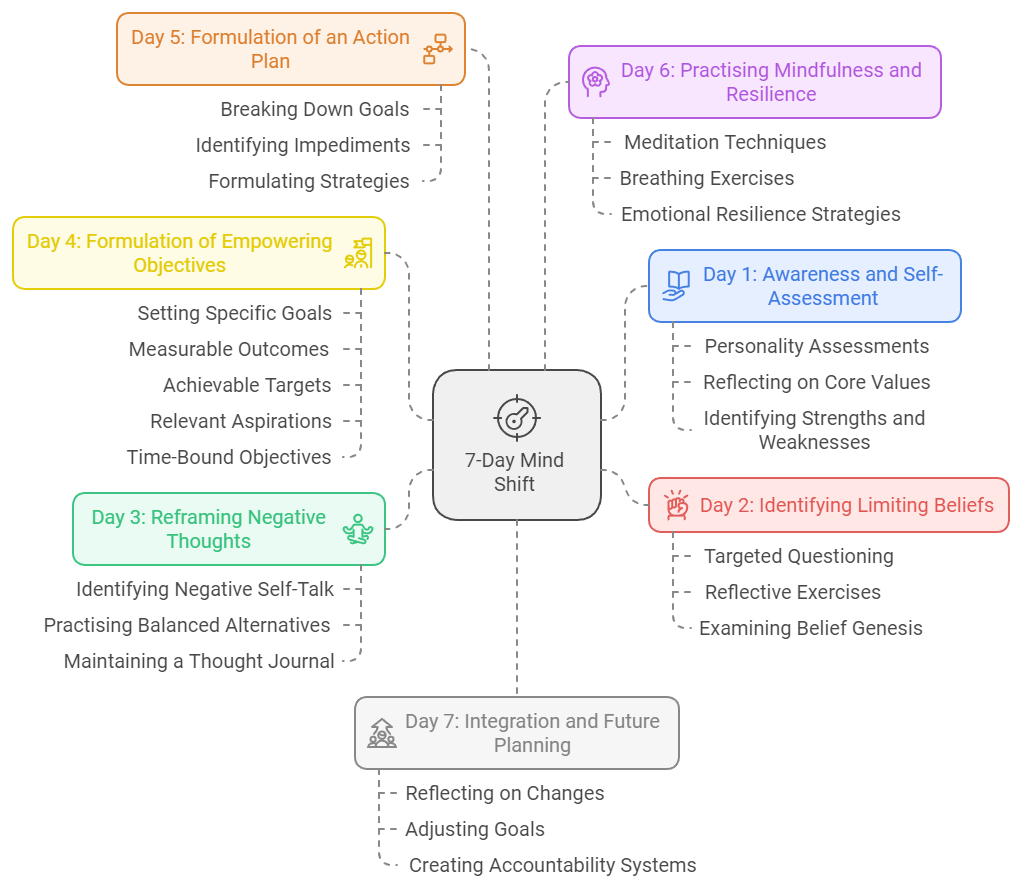A life coach can facilitate a significant transformation in an individual’s life, guiding them through a transformative seven-day journey that can alter their perspective profoundly. This intensive, week-long process is designed to challenge existing thought patterns, introduce new ways of thinking, and ultimately lead to a more positive and productive outlook on life. This article will examine the theoretical principles underpinning the 7-day mind shift and the potential impact it can have on personal and professional life.
Day 1: Awareness and Self-Assessment
The initial day of the mind shift process, conducted in collaboration with a life coach, is dedicated to fostering awareness and undertaking a comprehensive self-assessment. This pivotal stage establishes the groundwork for the transformative week that lies ahead.
The life coach will facilitate a series of exercises with the objective of enabling the client to gain a more profound comprehension of their current thought patterns, beliefs, and behaviours. You may be required to complete personality assessments, reflect on your core values, or identify your strengths and weaknesses. The process of self-discovery can be enlightening, uncovering aspects of the self that may have previously been unconsidered.
By the conclusion of the first day, participants will have a more nuanced understanding of their current position and the potential for improvement in specific areas of their lives. This awareness is of the utmost importance for the changes that will be made in the coming days.
Day 2: Identifying Limiting Beliefs
On the second day, the life coach will assist the client in identifying and challenging any limiting beliefs that may be impeding progress. Such beliefs are frequently deeply entrenched thoughts or assumptions that have been internalised and accepted as truth, despite a lack of empirical evidence to substantiate them.
By employing targeted questioning and reflective exercises, participants will be able to identify these self-imposed limitations. The coach may request that the client examine the genesis of these beliefs and consider how they have influenced their life choices and experiences.
The objective of the second day is not merely to identify these limiting beliefs; it is also to initiate the process of questioning and dismantling them. This process may initially be uncomfortable, but it can also be liberating, as it enables the individual to gain insight into how these beliefs have shaped their perspective and limited their potential.
Day 3: Reframing Negative Thoughts
With the preceding days having exposed the limiting beliefs that underpin negative thought patterns, Day 3 focuses on the practical skill of reframing such thoughts. The life coach will introduce cognitive restructuring techniques that can facilitate the transformation of pessimistic or unhelpful thought patterns into more positive and constructive ones.
The objective is to learn to identify instances of negative self-talk and to practise replacing these with more balanced and empowering alternatives. This is not about artificially imposing a positive outlook; rather, it is about developing a more realistic and optimistic perspective.

The coach may introduce exercises such as maintaining a journal of thoughts or utilising visualisation techniques to reinforce this novel approach to thinking. By the conclusion of the third day, the participant will have acquired the requisite practical tools to continue the reframing process in their daily lives.
Day 4: Formulation of Empowering Objectives
With the new perspective gained in the preceding days, the objective of Day 4 is to apply this new outlook to the formulation of empowering objectives. The life coach will facilitate the process of identifying the desired outcomes, both in the short and long term.
This process is not merely an exercise in listing objectives. The coach will assist the client in formulating goals that are SMART (specific, measurable, achievable, relevant, and time-bound), which are in alignment with the client’s values and newly discovered potential. Furthermore, the underlying motivations and aspirations that drive each goal will be examined in depth.
The goal-setting process entails the implementation of top career coaching strategies that facilitate success. These strategies challenge the individual beyond their comfort zone while ensuring that the goals set remain attainable. Achieving a balance is crucial for maintaining motivation and building confidence as one works towards one’s objectives.
Day 5: Formulation of an Action Plan
Once the objectives have been clearly delineated, the fifth day is devoted to the creation of a detailed action plan for their attainment. The life coach will assist the client in the process of breaking down their larger goals into smaller, more manageable steps, thus creating a roadmap for success.
This process entails the identification of potential impediments and the formulation of strategies to surmount them. Your coach may introduce techniques for time management, productivity hacks, or measures of accountability to support your journey.
By the conclusion of Day 5, the participant will have developed a comprehensive plan of action that is both motivating and realistic. This plan will function as a practical guide for implementing the perspective shifts that have been experienced over the course of the preceding few days.
Day 6: Practising Mindfulness and Resilience
As the 7-day mind shift draws to a close, Day 6 is dedicated to the cultivation of mindfulness and resilience. The acquisition of these skills is crucial for the sustenance of one’s newly acquired perspective in the face of the inevitable challenges that life presents.
The life coach will introduce a variety of mindfulness techniques, including meditation and breathing exercises, with the objective of assisting the individual in maintaining a state of presence and equilibrium. Furthermore, strategies for developing emotional resilience will be examined, with an emphasis on how to recover from adversity and maintain a positive outlook even in challenging circumstances.
The objective of this day is to equip you with the mental and emotional tools that will enable you to sustain your new perspective long after the coaching period has concluded.

Day 7: Integration and Future Planning
On the final day of the programme, the life coach will facilitate a process of integration and future planning. This is an opportunity to reflect on the changes that have occurred over the past week and to consider how these changes might be incorporated into one’s daily life in the future.
It may be beneficial to revisit the previously established goals and action plans, making any necessary adjustments based on the new insights gained. Furthermore, the coach will assist the client in developing strategies for maintaining their new perspective. This may entail the establishment of supportive habits or the creation of accountability systems.
The day’s activities conclude with a discussion of the subsequent steps to be taken and the means of continuing the personal growth journey beyond the intensive week. Your life coach may provide resources for continued support or suggest follow-up sessions to assist you in maintaining progress.
In conclusion, the 7-day mind shift, guided by a life coach, is an intensive and transformative experience that has the potential to revolutionise one’s perspective. By progressing through the stages of awareness, challenging limiting beliefs, reframing thoughts, setting goals, developing action plans, building resilience and integrating changes, it is possible to emerge with a completely new outlook on life.
This process is not merely a transient alteration; rather, it is an investment in the tools and mindset that will enable continued growth and evolution long after the week has concluded. The insights and strategies acquired during this week can result in enduring enhancements in personal relationships, career prospects, and overall life satisfaction. It is essential to recognise that the journey does not conclude after seven days. The true challenge lies in integrating the knowledge gained into one’s daily life. However, with the newly acquired perspective and the tools provided by the life coach, individuals are better equipped to navigate life’s challenges and opportunities with renewed confidence and clarity.















I would like to express my gratitude for this article. However, I question the feasibility of implementing such a significant change in a relatively short period of seven days. Furthermore, I am uncertain as to the suitability of this approach for all individuals, given that change processes can vary considerably from one person to another. I believe that some individuals may require a longer timeframe and more tailored guidance to achieve the desired outcomes.